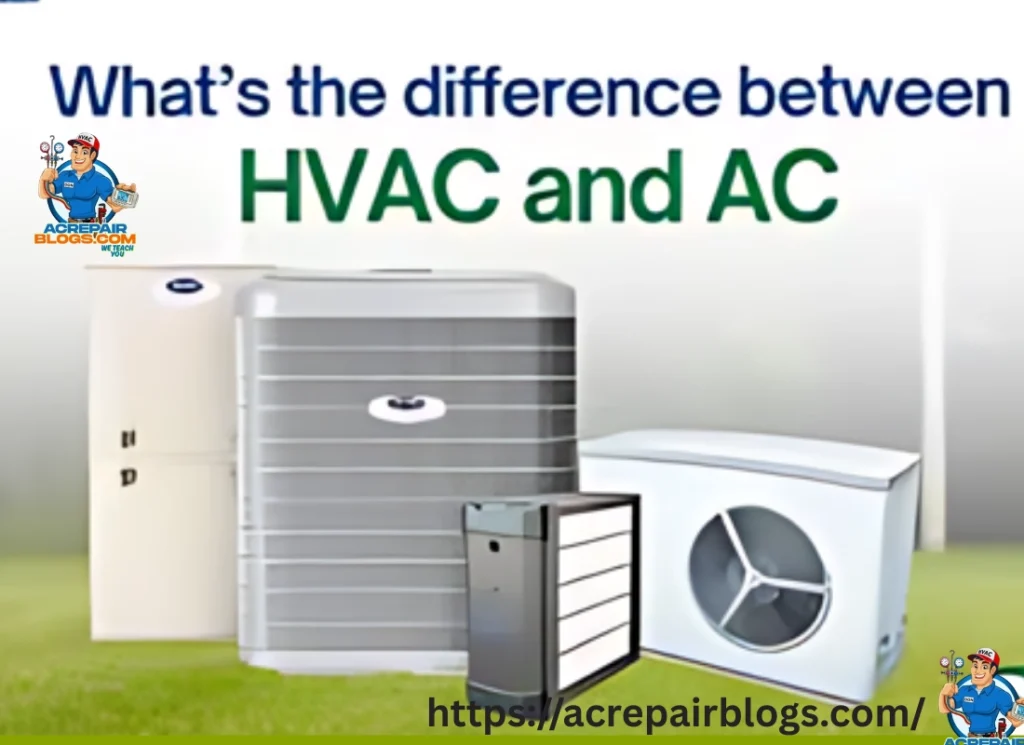Introduction
HVAC and AC are terms that you must have encountered when shopping a cooling system. On the face of it, they appear to be synonymous but they are not exactly synonymous. It is important to know the difference between HVAC and AC in order to choose the correct one to fit your home.
In this guide, we’ll break down HVAC vs AC, explore their functions, costs, pros and cons, and answer the ultimate question: HVAC or AC which is better for your home comfort?
HVAC vs AC: The Basics
- AC (Air Conditioner): A system that is used to cool inside air specifically. It can be a window unit, split system or central air conditioner.
- HVAC ( Heating, Ventilation, and Air Conditioning): It is a generalized term that encompasses heating, cooling and ventilation. It’s a complete climate-control system, not just cooling.
💡 Is HVAC the same as AC?
Not exactly.Not every HVAC system has an AC system, though every AC system has HVAC. AC focuses only on cooling, while HVAC handles year-round comfort cooling in summer, heating in winter, and ventilation all year.
Difference Between HVAC and AC
To clearly understand HVAC vs air conditioner, let’s compare:
| Feature | AC (Air Conditioner) | HVAC (Heating, Ventilation, AC) |
|---|---|---|
| Function | Cools indoor air | Heats, cools, and ventilates |
| Components | Compressor, coils, refrigerant, blower | Furnace/heat pump, AC, ducts, ventilation system |
| Seasonal Use | Summer | Year-round |
| Cost | Lower initial cost | Higher upfront, more comprehensive |
| Best For | Homes in hot climates | Homes needing both heating & cooling |
So, when comparing AC vs HVAC system, AC is a single-purpose solution, while HVAC offers an all-in-one climate management system.
Difference Between Central AC and HVAC System
Many homeowners get confused between central AC and HVAC systems.
- Central AC: A cooling-only system that uses ducts to distribute air throughout the home.
- HVAC System: It includes central AC and heating (furnace or heat pump) and ventilation.
👉 If you only need cooling, central AC might be enough. But if you want a complete year-round solution, HVAC is the better choice.
HVAC vs AC Pros and Cons
✅ Pros of AC
- Lower upfront cost compared to HVAC.
- Simpler installation and maintenance.
- Perfect where the summers are prolonged and winters mild.
- Can be installed as ductless mini-split (no ducts required).
❌ Cons of AC
- Only cools; no heating function.
- Requires a separate heating system in colder climates.
- Less efficient when you require heating and cooling.
✅ Pros of HVAC
- Year-round comfort: heating, cooling, and ventilation in one.
- Improved indoor air quality due to built-in ventilation.
- Energy-efficient options available (like heat pumps).
- Can add zoning for customized comfort in different rooms.
❌ Cons of HVAC
- Higher initial cost than AC.
- More complex installation.
- Regular professional maintenance required for all components.
When comparing HVAC vs AC pros and cons, the decision often comes down to whether you need just cooling or a full home comfort system.
HVAC vs AC: Which One Should I Have in my house?
This is one of the most common homeowner questions:HVAC vs AC: Which One Should I Have in my house? The answer depends on:
- Your Climate
- Hot year-round? AC may be enough.
- Cold winters and hot summers? HVAC is better.
- Your Budget
- AC is cheaper upfront but may require adding a furnace later.
- HVAC costs more initially but gives you an all-in-one solution.
- Your Home’s Needs
- If your home already has ductwork, HVAC installation is easier.
- Otherwise, ductless mini-splits (AC only or ductless HVAC) can work better.
Choosing Between HVAC and AC System for Home Comfort
When deciding on choosing between HVAC and AC system for home comfort, here are some tips:
- Evaluate long-term costs. HVAC may be more expensive upfront but saves money over time by combining heating and cooling.
- Think about energy efficiency. Modern HVAC systems with high SEER ratings (16+) are more energy-efficient than older AC units.
- Consider space and installation. AC units can be smaller and simpler to install, while HVAC requires more space and ductwork.
- Look at future needs. If you plan to stay in your home long-term, HVAC is usually the smarter investment.
Real-World Example: HVAC vs AC in Different Homes
- Home in Florida (hot climate): AC is often sufficient since winters are mild.
- Home in Chicago (cold winters, hot summers): HVAC makes more sense for year-round heating and cooling.
- Apartment with no ductwork: A ductless AC or ductless HVAC system is the most practical solution.
Maintenance Considerations
Regardless of whether you choose AC or HVAC, proper care is critical. Many AC maintenance mistakes (like dirty filters or clogged coils) apply to both systems.
- AC only: Maintenance is simpler—mainly filter changes and coil cleaning.
- HVAC: Requires extra care—furnace checks, ventilation cleaning, and seasonal tune-ups.
Conclusion
Understanding HVAC vs AC is crucial before investing in a cooling or climate control system.
- AC (air conditioner): Focuses solely on cooling. Best for hot climates with mild winters.
- HVAC (heating, ventilation, and air conditioning): Provides complete year-round comfort with heating, cooling, and air circulation.
In contrasting the difference between HVAC and AC, it is important to remember:
- AC = Cooling only.
- HVAC = Cooling + Heating + Ventilation.
If you’ve been wondering is HVAC the same as AC? the answer is no. HVAC includes AC but goes beyond.
So, whether you’re weighing HVAC vs AC pros and cons or thinking about the difference between central AC and HVAC system, the choice ultimately depends on your climate, budget, and comfort needs.
👉 Bottom line: If you want basic cooling, AC may be all you need. If you want total home comfort year-round, HVAC is the smarter investment.
